AI Knowledge Management: What It Is and Comparing 9 Top Solutions
Almost every company can benefit from using a knowledge base. But the advent of AI technologies are taking the traditional processes of Knowledge Management to a new level of benefit for support teams and businesses
Organizations can use these knowledge bases internally, or to create external, customer-facing resources too. These are often called self-serve or self-help solutions. Customer Service or Customer Experience (CX) teams need these, as do IT Service Management (ITSM) teams and outsourced vendors.
According to Salesforce, 89% of customers will return and stay loyal if they receive positive customer service whenever they need help. This includes the use of self-serve tools and content and AI-powered chatbots.
AI tools and software are proving an effective way of improving the creation and maintaining of content and context of knowledge bases. Hence the need for AI Knowledge Management.
In this article, we define AI Knowledge Management and list nine of the leading software solutions on the market.

What is AI Knowledge Management?
Knowledge Management AI is where AI tools are used in the collection, creation, curation, and discoverability of internal and customer-centric knowledge bases and resources.
Each of these are benefitted by AI in several ways:
-
Collection: AI tools can collect information automatically. Human agents can't possibly collect everything they are saying or writing when replying to customers. Also, until now automated systems that do collect this information only store the data. In most cases, that information isn't useful unless someone is tasked with crawling through it to create a knowledge article.
Now, with AI, all of that can be done automatically and at scale. This also increases the data quality.
- Creation: Because data from customer interactions and support tickets are collected automatically, tools with generative AI capabilities can then actually create the knowledge content automatically as well. Further, they can leverage NLP, machine learning, and other AI-driven systems to create new knowledge organizations need to support customers more effectively.
- Curation: All of that material will need curating to avoid duplication. It will also ensure the most relevant documents, articles, and other pieces of content will fit within the cognitive decision trees of the Knowledge Management system. AI makes that possible, simplifying and consolidating the data that's collected at scale.
- Discoverability: This is equally important. Without advanced knowledge discovery and search tools, users won't be able to easily find what they're looking for when they need it quickly. The best AI Knowledge Management platforms have these AI-powered discoverability tools. These ensure users can find what they need, which provides a better user experience.
Instead of trying to build/develop your own in-house AI Knowledge Management system, it's often more cost-effective to use an off-the-shelf solution. And so, let's look at nine of the best AI Knowledge Management software (SaaS) solutions on the market based on use cases, functionality, and other key factors.
9 Top AI Knowledge Management Solutions
-
Genesys
Genesys is an AI-based call center customer service agent SaaS platform that now includes AI-based Knowledge Management tools and functionality.
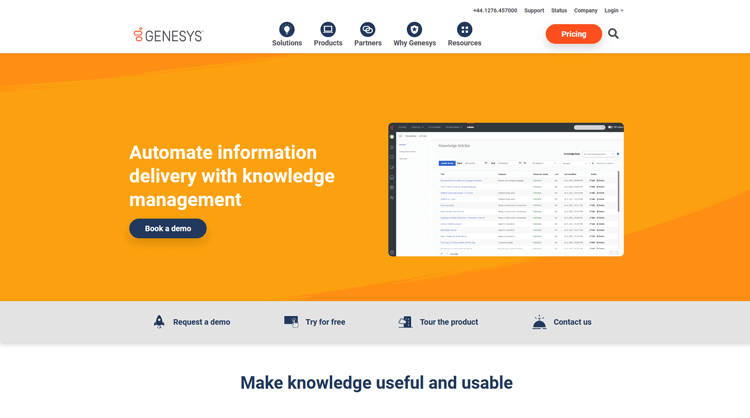
What does it do?
Makes it easier for customer service agents and CX team leaders and other management staff to record Knowledge Management data and information automatically to turn it into KM questions and answers.
Pros:
- Helps call centers and small and medium businesses (SMBs) improve customer interactions across every channel
- AI tools help to automatically record customer interactions and turn them into internal Knowledge Management resources
- Scalable solutions and a global presence
Cons:
- Known for being complex to set up and manage
- A steep learning curve for new teams trying to understand how to use it
- Might be too expensive for startups or internal teams with a limited software budget
Pricing: From $75 per agent per month
-
AIGEN
AIGEN is a software provider from India that delivers SaaS-based AI Knowledge Management tools customized for businesses.
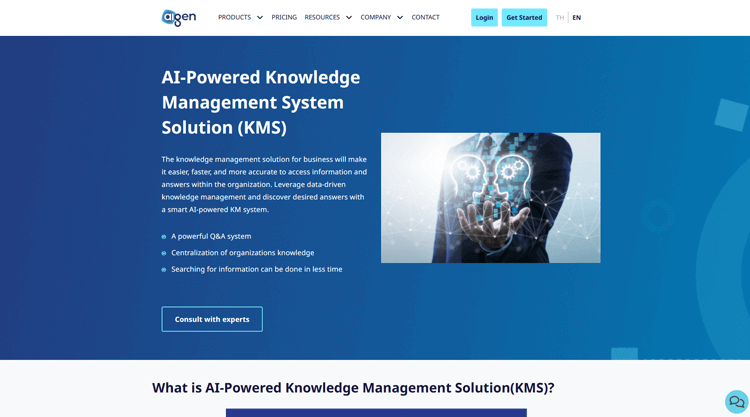
What does it do?
Similar to other tools on this list, with a range of basic Knowledge Management and AI integrations.
Pros:
- Integrates with other CX software via an API
- Use it to import and export customer service and Knowledge Management data in a variety of formats
- It can handle large volumes of data
Cons:
- Not as advanced as other tools on this list
- Considered expensive compared to other options
- Customer service isn't as good as competitors
Pricing: Customized pricing
-
Lucy.ai
Lucy is an AI-centric Knowledge Management capture and updating application.
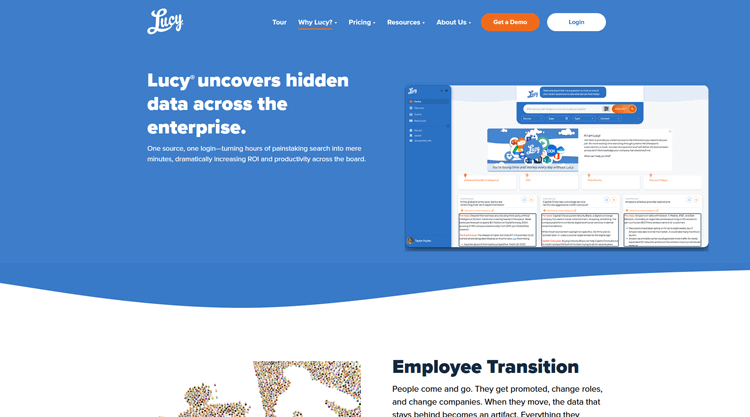
What does it do?
Designed as a one-stop solution for Knowledge Management with AI-powered knowledge capture and updating SaaS features.
Pros:
- Easy to set up
- Integrates with other systems and software often used by CX and ITSM teams
- Designed to be a single gateway to enterprise organizational knowledge especially for CX and ITSM teams
Cons:
- Quite expensive for SMBs and startups
Pricing: Pre-paid bundles from $49,500 per year. Customized pricing, with that as the lowest that Lucy charges
-
Starmind
Starmind is a directory for Knowledge Management with some handy AI-powered features and functionality.
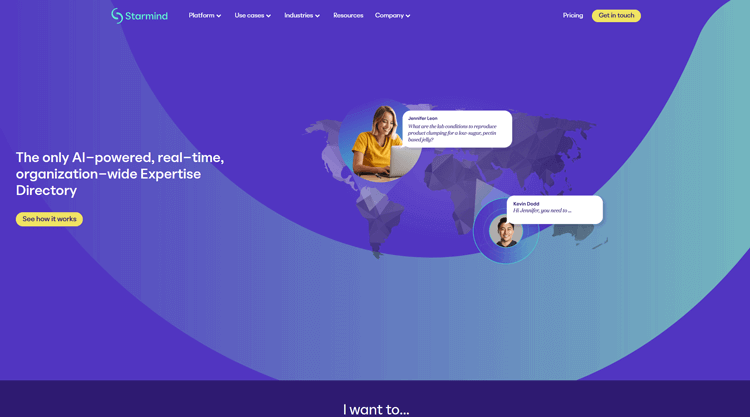
What does it do?
Starmind is described as "The only AI-powered, real-time, organization-wide Expertise Directory." It's designed for several use cases including customer service, sales, and supporting internal AI solutions such as large language models (LLMs).
Pros:
- Easy to deploy and use
- Anybody with access can ask questions and this can be anonymous
- Team members can download the mobile app so it can be useful on the go and when working from home (WFH)
Cons:
- Answers aren't always accurate
- Search queries can't be prioritized
Pricing: From $6 per user per month
-
Guru
Guru was designed to make internal information, company data, and Knowledge Management articles more easily accessible to everyone who needs that material.
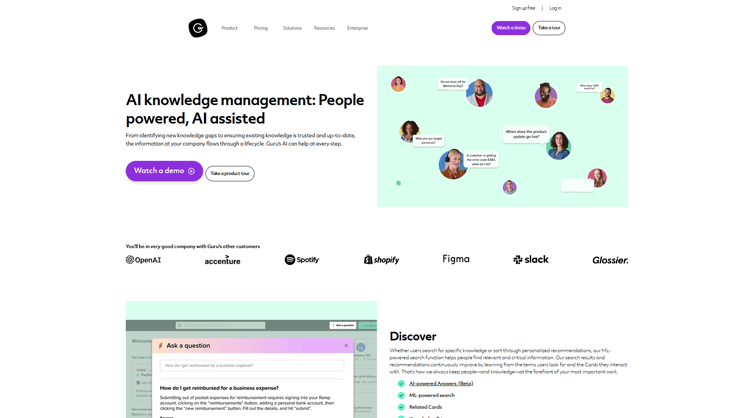
What does it do?
An AI Knowledge Management assistant, also known as an AI-powered bot, for internal knowledge bases.
Pros:
- A useful resource when integrated with other software and apps the team uses
- Useful for onboarding new employees
- Can produce a summary of existing documents
Cons:
- At present AI-powered answers are still only in beta so they may not be as accurate as your CX or ITSM agents might need
- Intuitive-ish design that still requires some work
- The knowledge within the platform is only as effective as how often the team updates the articles
Pricing: From $12 per user per month
-
Korra
Korra is an AI tool that helps customer service and ITSM agents find answers to information they need quickly.
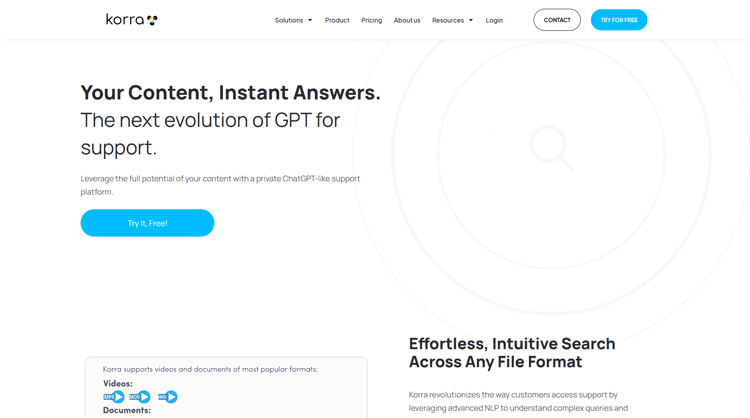
What does it do?
Korra is described as an evolution of GPT, meaning OpenAI's ChatGPT-4, as a support platform for customer service, customer experience (CX), and ITSM teams.
Pros:
- Easy to set up and implement
- Uses Natural Language Processing (NLP) and AI to generate tags and support documents
- Helpful customer support
Cons:
- The results it generates aren't always very optimized, perhaps because it relies on GPT-4 to create content
- Doesn't integrate with Google Docs or other Google Workspace products unless they're in a non-native format such as a PDF
- Difficult to customize for every use case
Pricing: Business plans start at $99/monthly
-
Capacity
Capacity is an AI support tool that interlinks and connects all of your CX and ITSM tech stack, somewhat like Zapier.
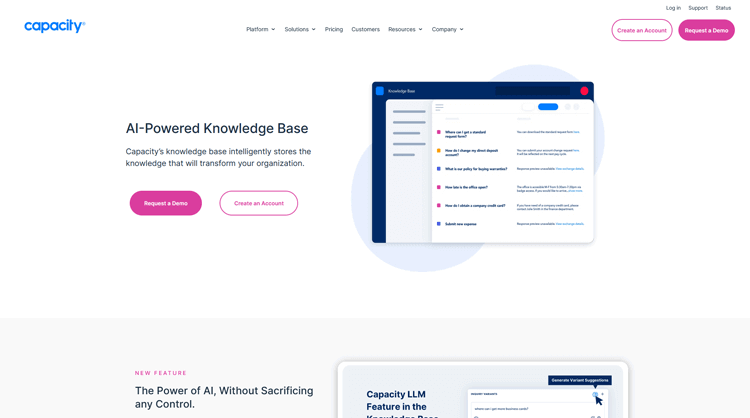
What does it do?
"Capacity's knowledge base intelligently stores the knowledge that will transform your organization." It's an AI-powered knowledge base and Knowledge Management system for CX and ITSM, and it's also equally useful for other teams such as sales, marketing, and human resources (HR).
Pros:
- Useful for automating functions that were previously recorded manually
- Cross-functional so it can be deployed across an entire organization
- It gets smarter as more inputs and data are provided
Cons:
- It can get expensive when being used across larger teams
- The product is still learning and evolving so it does have limitations
- Steep learning curve for those who haven't used AI-powered tools before
Pricing: From $49 per user per month
-
Tettra
Tettra is another powerful AI Knowledge Management application for enterprise organizations.
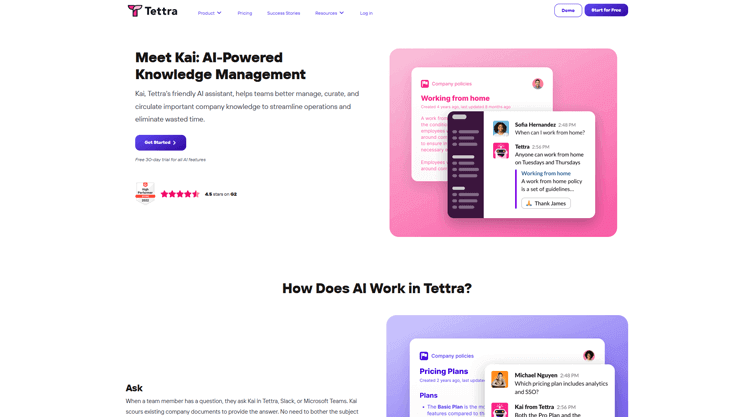
What does it do?
Tettra is an AI tool that allows you to "Create new internal documentation with Tettra's simple editor, or use existing content from Google Docs, Notion, local files, and more to build your knowledge base quickly."
Pros:
- Comes with lots of features including AI Knowledge Management and an AI knowledge base
- Slack integration so that an AI can answer your team's questions in real-time
- Save reusable answers to turn them into knowledge base articles
Cons:
- Limited integrations at present
- Doesn't always generate the right answers from the information provided
Pricing: Starts from $5 per user per month (a minimum of 10 required, so it works out at $50/monthly)
-
ChatGPT-4
OpenAI's ChatGPT-4 needs no introduction as it is the AI tool that started this AI revolution. Microsoft is a major partner and investor and thousands of entrepreneurs are building AI-based SaaS tools off the back of GPT-4.
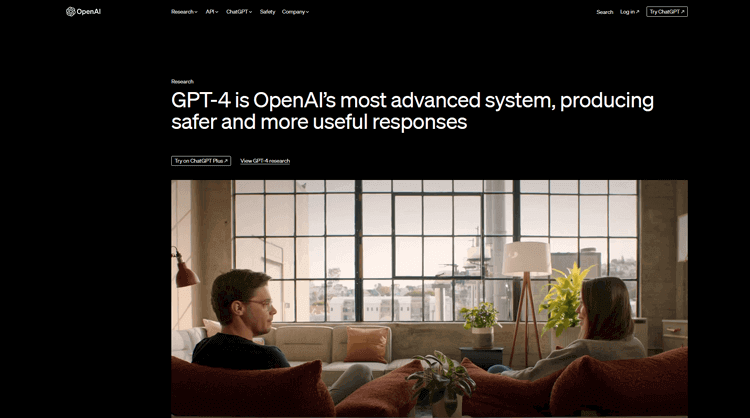
What does it do?
Unlike other tools on this list, GPT-4 is not specifically designed as a Knowledge Management system. However, with apps built on GPT-4 or integrated with this AI model, you can use it for Knowledge Management.
Pros:
- A highly versatile large language model (LLM) that can be adapted for numerous use cases including Knowledge Management
- Numerous apps that use or integrate with GPT-4 so that they can be used for Knowledge Management, including several on this list
Cons:
- It's difficult to use GPT-4 for this or other specific use cases without the relevant integrations and apps, and you'll need to look for those via the API or third-party websites and platforms
- Versatile but comes with limitations and there are widely-known data privacy concerns
Pricing: From $20 per user per month
Key Takeaways: Time to Invest in AI Knowledge Management
AI can more effectively understand customer queries, assign them to the right agents, save CX and ITSM time and money, and improve and enhance knowledge bases. Businesses willing to research and invest in applying this new technology can be rewarded with the many advantages AI can bring to Knowledge Management.
Discover the Giva Difference
Is it time your business experienced the Giva difference? Boost your customer support with Customer Service Software in the Cloud.
Simple clean design. Transforming everyday customers into raving fans, brand ambassadors and evangelists.
Giva has implemented new AI-based features, so you can now get the benefits of AI across our software solutions. Try Giva today.





